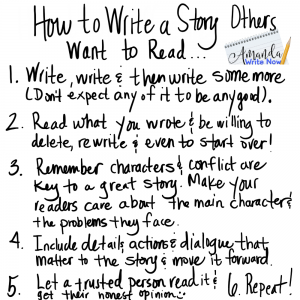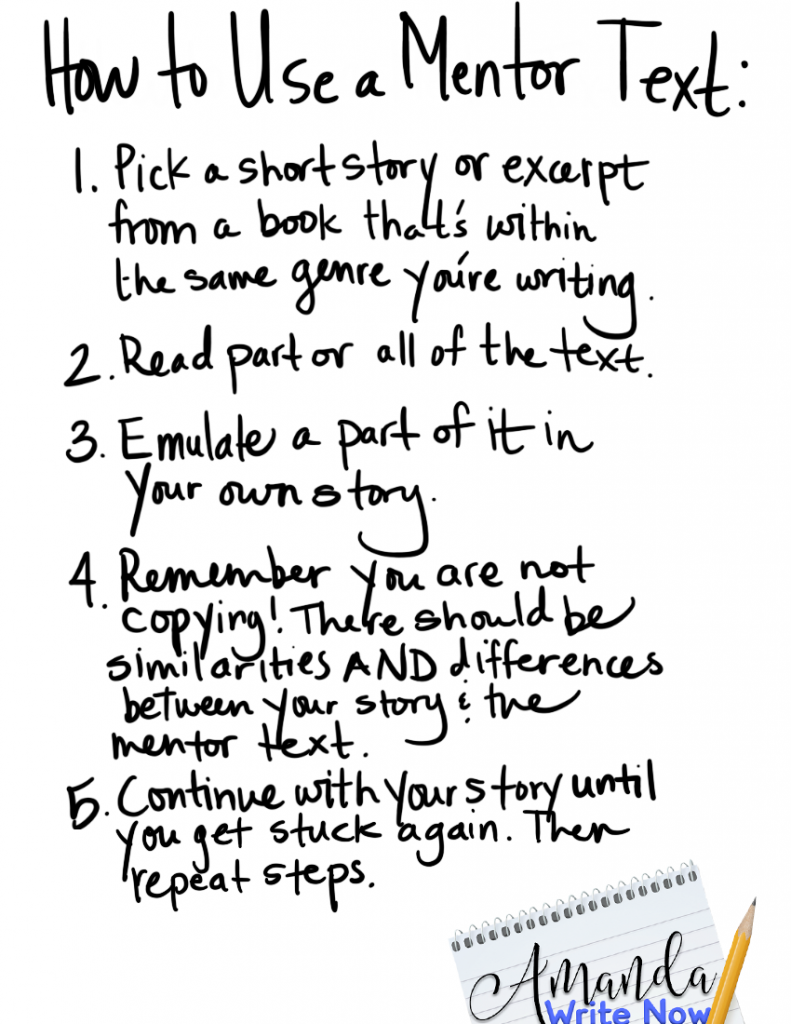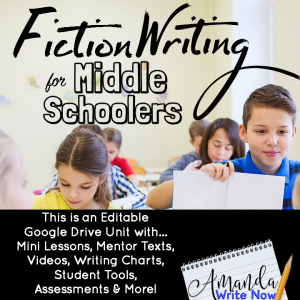
Fiction writing is neglected in English classes everywhere for many reasons. We don’t have enough time. Or we are afraid students might produce pages and pages and pages and we feel too guilty about not reading all of those pages! Or maybe some of us don’t do it because we feel it’s just not academic enough…
In the TED Talk I’ve included below, Ken Robinson talks about the hierarchy of subjects and how more “academic” subjects like math and English are valued over subjects like drama and music. I would argue within each subject there is a hierarchy as well. Personal narrative, information writing and argument writing are taught year after year after year, but for some reason fiction writing is not.
Fiction writing is not fluff.
We need to make it part of our curriculums NOW and stop neglecting this important component of an English curriculum. I have managed to squeeze more and more fiction writing into little corners of each school year and this year I plan to teach an entire unit. Check out this editable Google Slides Fiction Writing Unit to see exactly what topics I cover.
Personal narrative, information and argumentative writing have been front and center for years now and I hope this article convinces you to bring back fiction writing. I’ll lay out five reasons why in the rest of this article…
1. Students Learn Plot Elements
Personal narratives and fantasy/dystopian/fairytale/stories really actually have a lot in common. Each of these genres of writing has these elements: setting, characters, dialogue, description, conflict, climax, resolution. So why not teach these aspects of a story through a free choice fictional unit where students choose the genre they want to write? Why always teach personal narrative, year after year after year without ever giving fiction a chance? The same standards can be taught through fiction writing!

2. Students Build Stamina
When you let students write fiction, many want to continue writing after class! Isn’t that the ultimate goal of an English teacher? Students applying what they learn outside of the class for intrinsic purposes? Not because anyone forced them? Enough said.
3. Many Standards Can be Taught
The common core standards actually state:
CCSS.ELA-LITERACY.W.8.3
Write narratives to develop real or imagined experiences or events using effective technique, relevant descriptive details, and well-structured event sequences.
Key word: imagined
There are many other terms found in the standards that could be covered during a fiction writing unit: dialogue, pacing, description, transition, sequence, conclusion, purpose, audience, planning, drafting, revising, editing, capitalization, punctuation, spelling, passive voice…
Shall I say more?
4. Students Want to Share
During fiction writing units students actually beg to share. They are thrilled to watch an audience’s reaction to their imaginative stories. Be warned though…it can be quite exhausting having student after student come up to you wanting to read an excerpt from their story. Try it. You’ll see.
5. Students Elaborate…Finally!
Okay, not every student is going to be a writing machine. But, you can be sure that many, many students will surprise you with their elaboration skills. Students transform into real storytellers before your eyes, when you let them write fiction.
Pitfalls of Fiction Writing:
Okay so, if I haven’t convinced you yet why you should start teaching fiction writing then you can go ahead and move on from here. But if I HAVE convinced you, here are some pitfalls to avoid when teaching a fiction writing unit:
1. Writing Epic Novels
If you notice a student is writing pages and pages and pages praise them! Say something like, “Wow I think you might become a published author one day!”. THEN, guide them toward another short story idea. I would limit your fiction writing unit to students writing short stories. These short stories can be any fiction genre students would like, but they have to be short! How else are you going to be able to read them all and grade them? You need to set a limit.
2. Not Reading Mentor Texts
Every writing unit needs to be preceded by a reading unit. This is probably the very best piece of advice I picked up when I attended the Reading and Writing Institute in NYC. I always start out by sharing samples of the kind of writing my students are expected to write soon. So…introduce lots and lots of great fictional short stories to your students. Aren’t sure where to find these mentor texts? Check out this resource. There are many fictional mentor text links provided in this resource to share with your students! This video can also be helpful in finding your own mentor texts.
3. Ending with “To be cont…”
Students need to be aware of the cliches in writing and this is definitely a cliche, especially if you know very well that the story is probably not going to be continued. Teach students that this phrase is only used when there actually is a sequel written or firmly in the works.
4. A Free for all Mentality
I’ve definitely done this. I’ve said something like this to students, “Okay everyone! It’s October. Let’s write scary stories.” Then end, haha! As I stated earlier, actual content CAN and SHOULD be taught during a fiction writing unit. Just because it’s fiction doesn’t mean you can’t teach valuable academics too!
5. Moving on too Soon
Every writing unit should end with some sort of culminating event where students’ stories are published and celebrated in some way. It is so important to honor students’ hard work, their creativity and their willingness to try something new. The best way to do that is by sharing students writing in some way. Read 10 Ways to Publish Student Writing to get more inspiration about how to do this.
Wrap Up
So there you have it. I believe bringing back fiction writing is essential for students and you as the teacher. It is enjoyable and there is so much that students can take away from endeavoring to write a fictional short story, not to even mention they build their creative muscles in the process!
I’d love to hear from you now! Do you teach fiction writing? If not, why? If you do, how do you fit it in? Tell me in the comments below.


Thank you Amanda for this post! I have been pressured, often as an ELA teacher to push non-fiction reading for my kids. I have never understood this because they get non-fiction reading literally EVERYWHERE ELSE in their academic lives. History and science teachers need to be explicitly addressing the common core standards too, and much of the skills based on reading, writing, and research based on the use and production of expository materials should be assessed in those other classes. Our jobs is to forward literacy as best we can, which REQUIRES fictional texts–ESPECIALLY novels! I am not saying that ELA teachers should not this exclusively, but the push to take on more and more in the secondary level–culminating in a near total departure from fiction by 12th grade is a major mistep. Again, not listening to teachers, and allowing them to create their own standards and practices yeilds tragic results.
Thank you for your comment and mentioning the ways in which nonfiction can be embedded into other subject areas. I think that when teaching fiction, reading novels and emulating various aspects of the novel (author’s tone, voices, purpose, style, characterization, plot structure) could make reading and writing so much more fun for students!